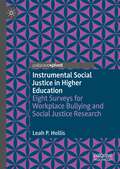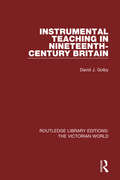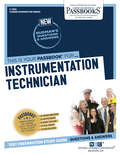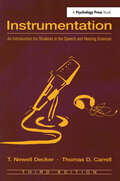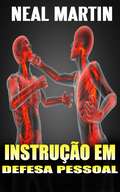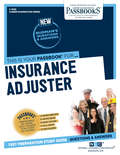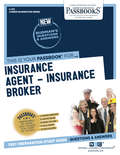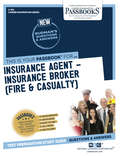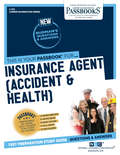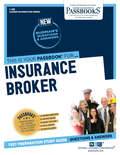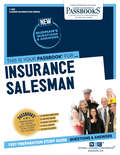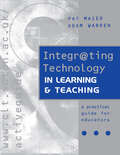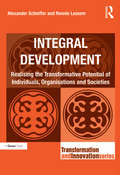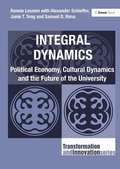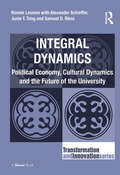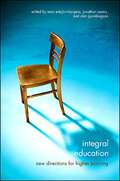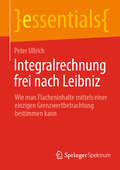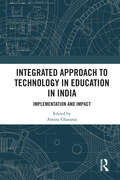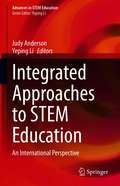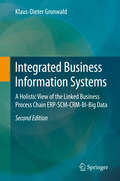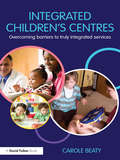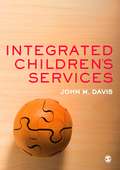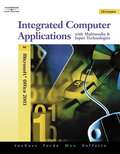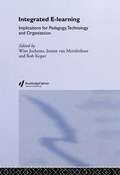- Table View
- List View
Instrumental Social Justice in Higher Education: Eight Surveys for Workplace Bullying and Social Justice Research
by Leah P. HollisThis book offers eight validated instruments on workplace bullying to support robust mixed methods approaches for social justice research. Workplace bullying is an excellent starting point from which scholars can consider social justice research. The data shows that marginalized and disenfranchised groups (minoritized groups, women, junior faculty, and the LGBTQ+ community) are disproportionately affected. The outcomes included career interruption and severe health disparities. Though there is a demand for workplace bullying instruments, the book also lays a foundation for creating surveys to address these populations more effectively.
Instrumental Teaching in Nineteenth-Century Britain (Routledge Library Editions: The Victorian World)
by David GolbyFirst published in 2004, this book demonstrates that while Britain produced many fewer instrumental virtuosi than its foreign neighbours, there developed a more serious and widespread interest in the cultivation of music throughout the nineteenth century. Taking a predominantly historical approach, the book moves from a discussion of general developments and issues to a detailed examination of violin pedagogy, method and content, which indicates society’s influence on cultural trends and informs the discussion of other instruments and institutional training that follows. In the first study of its kind, it examines in depth the inextricable links between trends in society, education and levels of achievement. It also extends beyond profession and ‘art’ music to amateur and ‘popular’ spheres. A useful chronology of developments in nineteenth-century British music education is also included. This book will be of interest to those studying the history of instrumental teaching and Victorian music.
Instrumentation Technician: Passbooks Study Guide (Career Examination Series)
by National Learning CorporationThe Instrumentation Technician Passbook® prepares you for your test by allowing you to take practice exams in the subjects you need to study. It provides hundreds of questions and answers in the areas that will likely be covered on your upcoming exam.
Instrumentation: An Introduction for Students in the Speech and Hearing Sciences
by T. Newell Decker Thomas D. CarrellWhile keeping the scope and essential thrust of the original book unchanged, this third edition has been updated to reflect the latest technology. For instance, important revisions have been made to a few chapters, while one chapter has been eliminated and replaced with a newer chapter dealing with recent developments in digital and consumer electronics that are relevant to laboratory instrumentation. The authors hope the readers of this text will be more confident with instrumentation and more willing to experiment with it, as well as be able to appreciate the possible ways that electronic instrumentation can be used in their work. The book was written with the undergraduate in speech and hearing sciences uppermost in mind. Instead of detailed information about individual pieces of instrumentation, a more basic and broad descriptive approach has been used. Throughout, examples have been provided regarding how certain pieces of equipment can be used in the clinic or laboratory. One or more step-by-step exercises are included at the end of certain chapters to help students obtain hands-on experience and equipment flowcharts help reinforce the exercise. Students who complete this book will have a basic understanding of the major pieces of instrumentation in the hearing and speech clinic/laboratory.
Instrução em defesa pessoal
by Neal Martin Lisa HenriquesInstrução em defesa pessoal Especialista em Defesa Pessoal Livro II Neal Martin
Insurance Adjuster: Passbooks Study Guide (Career Examination Series #C-3636)
by National Learning CorporationThe Insurance Adjuster Passbook® prepares you for your test by allowing you to take practice exams in the subjects you need to study. It provides hundreds of questions and answers in the areas that will likely be covered on your upcoming exam, including but not limited to: interviewing; understanding and interpreting tabular material; preparing written material; reading, understanding and applying complex written material; and other related areas.
Insurance Agent – Insurance Broker: Passbooks Study Guide (Career Examination Series #C-373)
by National Learning CorporationThe Insurance Agent – Insurance Broker Passbook® prepares you for your test by allowing you to take practice exams in the subjects you need to study. It provides hundreds of questions and answers in the areas that will likely be covered on your upcoming exam.
Insurance Agent – Insurance Broker: Passbooks Study Guide (Career Examination Series #C-373)
by National Learning CorporationThe Insurance Agent – Insurance Broker (Fire & Casualty) Passbook® prepares you for your test by allowing you to take practice exams in the subjects you need to study. It provides hundreds of questions and answers in the areas that will likely be covered on your upcoming exam, including but not limited to: reading and interpreting written material; understanding basics of insurance; understanding and interpreting tabular material; preparing written material; reading, understanding and applying complex written material; and other related areas.
Insurance Agent: Passbooks Study Guide (Career Examination Series #C-373)
by National Learning CorporationThe Insurance Agent (Accident & Health) Passbook® prepares you for your test by allowing you to take practice exams in the subjects you need to study. It provides hundreds of questions and answers in the areas that will likely be covered on your upcoming exam.
Insurance Broker: Passbooks Study Guide (Career Examination Series #C-388)
by National Learning CorporationThe Insurance Broker Passbook® prepares you for your test by allowing you to take practice exams in the subjects you need to study. It provides hundreds of questions and answers in the areas that will likely be covered on your upcoming exam.
Insurance Planning
by James F. Dalton Michael A. Dalton Thomas P. Langdon Joseph M. GilliceThis book is written for undergraduate and graduate level students interested in acquiring an understanding of financial planning from a professional financial planning viewpoint. The text is intended to be used in an overall curriculum in financial planning in an Insurance course or in a course that combines Fundamentals of Financial Planning and Insurance.
Insurance Salesman: Passbooks Study Guide (Career Examination Series)
by National Learning CorporationThe Insurance Salesman Passbook® prepares you for your test by allowing you to take practice exams in the subjects you need to study. It provides hundreds of questions and answers in the areas that will likely be covered on your upcoming exam, including but not limited to: insurance principles and practices; Business Law; and more.
Integr@ting Technology in Learning and Teaching: A Practical Guide For Educators
by Maier, Pat Warren, Adam (both of the Interactive Learning Centre, Southampton University)This volume looks at the issues involved in integrating new technologies within the education process. It includes activities, case studies and notes for use by all teaching in higher education.
Integral Development: Realising the Transformative Potential of Individuals, Organisations and Societies (Transformation and Innovation)
by Ronnie Lessem Alexander SchiefferAlexander Schieffer and Ronnie Lessem introduce a groundbreaking development framework and process to address the most burning issues that humanity faces. While conventional top-down, outside-in development has reached a cul-de-sac, a new, integral form of development is emerging around the world. Integral Development uniquely articulates this emergent approach, and invites us to fully participate in this process. The integral approach has been researched and framed over decades of in-depth experience in transformative development education and practice all over the world. It uniquely combines four mutually reinforcing perspectives: nature and community; culture and spirituality; science, systems and technology; and enterprise and economics. Conventional development theory and practice has prioritized the latter two perspectives, neglecting the former two. This has caused massive imbalances in today’s world. The four interconnected perspectives allow for a transformative and integrated engagement with core development issues in a way that is locally relevant and globally resonant. Throughout, the practical impact of Integral Development is brought to life through highly innovative cases from around the globe, drawing on the authors` first-hand experience. This makes the book a living demonstration of the power of this pioneering approach. Integral Development shows how individual, organizational and societal developments need to be interconnected to release a society’s full potential. It shifts the responsibility for large-scale development from often-distant experts and organizations to each individual, community, enterprise and institution within the society. It is essential reading - and a call to action - for everyone concerned with the current state of local and global development.
Integral Dynamics: Political Economy, Cultural Dynamics and the Future of the University
by Ronnie Lessem Alexander Schieffer Junie T. Tong Samuel D. RimaThe theory of integral dynamics is based on the view that the development of individual leaders or entrepreneurs requires the simultaneous development of institutions and societies. It seeks a specific way forward for each society, fundamentally different from, but drawing on, its past. Nearly every natural science has been transformed from an analytically-based approach to a dynamic one: now it is time for society and culture to follow suit locally and globally. Each culture, discipline and person is incomplete and is in need of others in order to develop and evolve.
Integral Dynamics: Political Economy, Cultural Dynamics and the Future of the University (Transformation and Innovation)
by Ronnie Lessem Alexander Schieffer Samuel D. RimaThe theory of integral dynamics is based on the view that the development of individual leaders or entrepreneurs requires the simultaneous development of institutions and societies. It seeks a specific way forward for each society, fundamentally different from, but drawing on, its past. Nearly every natural science has been transformed from an analytically-based approach to a dynamic one: now it is time for society and culture to follow suit locally and globally. Each culture, discipline and person is incomplete and is in need of others in order to develop and evolve. This book sets out a curriculum for a new integral, trans-cultural and trans-disciplinary area of study, inclusive of, but extending beyond, economics and enterprise. It embraces a trans-personal perspective, linking self with community, enterprise and society, and focusing on the vital relationship between local identity and global integrity. For the government policy maker, the enlightened business practitioner, and the student and researcher into economics and enterprise, the new discipline is set out here in complete detail by a multi-national team of Gower's Transformation and Innovation Series authors. Illuminated with examples relating the conceptual to the practical, this is a text, not for a pre-modern, modern, or even post-modern era, but for what has been called our trans-modern age.
Integral Education: New Directions for Higher Learning (SUNY series in Integral Theory)
by Olen Gunnlaugson Sean Esbjörn-Hargens Jonathan ReamsThe educational challenges being faced today are driving us toward a new step in the evolution of educational theory and practice. Educators are called to go beyond simply presenting alternatives, to integrating the best of mainstream and alternative approaches and taking them to the next level. Integral Education accomplishes this by bringing together leading researchers and practitioners from higher education who are actively exploring the frontiers of education from an integral perspective. It presents an overview of the emerging landscape of integral education from a variety of theoretical and applied perspectives. Key characteristics of integral education include: exploring multiple perspectives, employing different pedagogical techniques (e.g., reflective, dialogical, empirical), combining conceptual rigor with embodied experience, drawing on developmental psychology, and cultivating a reflective and transformative space for students and teachers alike. Integral Education provides the most comprehensive synopsis of this exciting new approach and serves as a valuable resource for any integral effort within education.
Integralrechnung frei nach Leibniz: Wie man Flächeninhalte mittels einer einzigen Grenzwertbetrachtung bestimmen kann (essentials)
by Peter UllrichIn einem Manuskript aus dem Jahre 1676 behandelt Gottfried Wilhelm Leibniz (1646–1716) die Integration monotoner Funktionen. Hieraus lässt sich eine Integrationstheorie entwickeln, mittels derer man alle in der Schule verwendeten Basisfunktionen integrieren und allgemeine Integrationsregeln herleiten kann. Im Gegensatz zu dem üblichen formalen Zugang benötigt diese Theorie nur einen propädeutischen Grenzwertbegriff, wie er in den KMK-Bildungsstandards gefordert wird; letztlich reicht eine einzige Grenzwertbetrachtung aus. Zudem wird die Integralrechnung nicht auf eine Umkehrung der Differentialrechnung reduziert.
Integrated Approach to Technology in Education in India: Implementation and Impact
by Amina CharaniaThis book explores the evolution of Integrated approach to Technology in Education (ITE), an initiative of Tata Trusts in India, and the many innovative ways in which it has helped enrich the learning process and fostered new skills for young people, especially those living in challenging environments. The book offers an in-depth look into authentic, creative and project-based learning experiences that have been facilitated by using technology in education in different settings in India, with case studies about opportunities and challenges of implementing ITE in the tribal pockets of West Bengal and Maharashtra, madrasas in West Bengal, government schools in rural Assam and sites in Uttar Pradesh. It examines the viability and sustainability of using ITE and other digital methods to address the complex education needs of children and address the challenges in the professional development of teachers. It also highlights the creative use of inquiry, project-based collaborative learning and distance education technologies during the pandemic in government-run schools. This book will be of interest to teachers, students and researchers of education, education technology, ICT and education, digital education and information technology. It will also be useful for educators, policymakers, educational institutions, EdTech start-ups and NGOs in the education sector.
Integrated Approaches to STEM Education: An International Perspective (Advances in STEM Education)
by Yeping Li Judy AndersonThis book provides a platform for international scholars to share evidence for effective practices in integrated STEM education and contributes to the theoretical and practical knowledge gained from the diversity of approaches. Many publications on STEM education focus on one or two of the separate STEM disciplines without considering the potential for delivering STEM curriculum as an integrated approach.This publication analyzes the efficacy of an integrated STEM curriculum and instruction, providing evidence to examine and support various integrations. The volume focuses on the problems seen by academics working in the fields of science, technology, engineering and mathematics (STEM) and provides valuable, high quality research outcomes and a set of valued practices which have demonstrated their use and viability to improve the quality of integrated STEM education.
Integrated Business Information Systems: A Holistic View of the Linked Business Process Chain ERP-SCM-CRM-BI-Big Data
by Klaus-Dieter GronwaldEnterprise Resource Planning (ERP), Supply Chain Management (SCM), Customer Relationship Management (CRM), Business Intelligence (BI) and Big Data analytics (BDA) are business related tasks and processes, which are supported by standardized software solutions. The book explains that this requires business-oriented thinking and acting from IT specialists and data scientists. It is a good idea to let students experience this directly from the business perspective, for example as executives of a virtual company in a role-playing game. The second edition of the book has been completely revised, restructured and supplemented with actual topics such as blockchains in supply chains and the correlation between Big Data analytics, artificial intelligence and machine learning. The structure of the book is based on the gradual implementation and integration of the respective information systems from the business and management perspectives. Part I contains chapters with detailed descriptions of the topics supplemented by online tests and exercises. Part II introduces role play and the online gaming and simulation environment. Supplementary teaching material, presentations, templates, and video clips are available online in the gaming area. The gaming and business simulation Kdibisglobal.com, newly created for this book, now includes a beer division, a bottled water division, a soft drink division and a manufacturing division for barcode cash register scanner with their specific business processes and supply chains.
Integrated Children's Centres: Overcoming Barriers to Truly Integrated Services
by Carole BeatyDesigned to be a one-stop-shop to meet the needs of local communities, Children’s Centres represent a revolutionary shift in the way children’s services are delivered to families. Integrated Children’s Centres looks at the way in which Children’s Centre development has built upon the research and experiences of initiatives such as the HeadStart programme in America and the SureStart programme. Exploring the component elements of truly integrative services and the key players in ensuring positive outcomes: families, the local authority, PCT, private and voluntary sectors, and faith groups, this book covers: the challenges faced by children’s centres how to tackle social issues through the medium of children's centres achieving effective multi-agency working and true collaboration the essentials of leading and managing children’s centres the benefits of early intervention how to effectively deliver health care, education and children’s services. Providing a wealth of case studies, this highly topical book will be of interest to nursery and children’s centres managers and early years practitioners enrolled on the NPQICL or EYPS programmes, as well as students working towards a degree in Early Childhood Studies or MA in Early Years.
Integrated Children's Services
by John M. DavisWorking together with fellow professionals across different sectors of children’s services is central to good practice for all those who work with children and young people. This book looks at how children’s services can work together more effectively; by taking an approach that is grounded in research, the book engages critically with both the benefits and the pitfalls of integrated working. The book encourages the reader to reflect on their own background and how this influences their view of specific children, families and fellow professionals, as well as their own practice. Suitable for all those working with children and young people from Birth to 19 in any aspect of children’s services, this book will ensure professionals work together successfully to the benefit of all.
Integrated Computer Applications With Multimedia And Input Technologies
by Connie M. Forde Donna L. Woo Linda Hefferin Susie VanHussIntegrated E-Learning: Implications for Pedagogy, Technology and Organization (Open and Flexible Learning Series)
by Rob Koper Jeroen Van Merriënboer Wim JochemsIt is widely recognized that online and e-learning is no longer an exclusive approach used only in distance education and in isolation from traditional education programmes. A real difficulty facing educators and trainers is how to integrate these new learning methods and embed them in established and existing forms of learning, teaching or training. This book forms a serious, in-depth study of the subject and proposes that e-learning is not simply a matter of 'digitizing' traditional materials, but involves a new approach, which must take into account pedagogical, technological and organizational features to form a well-designed education system. A practical focus is maintained throughout, with advice on implementation and case studies drawn from the contributors' considerable experience.Integrated E-Learning is essential reading for anyone wanting to implement, design, develop or deliver e-learning or training courses.
